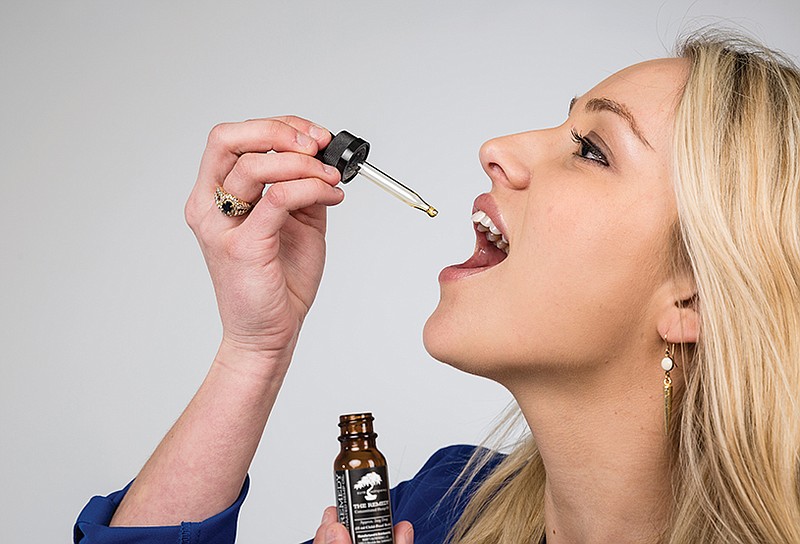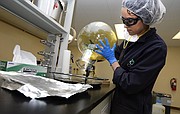CBD products
Want to give CBD a try? Here are some products you can find locally.Mary’s Nutritionals (available at Natural Body Spa & Shop, Stylebar, Wildflower Tea Shop and Apothecary, Collective Clothing and Southern Sqweeze)• Transdermal patch• Gel pen• Topical compound• Remedy oil• Muscle freeze• Pet penKat’s Naturals (available at Lucidity Float Center of Chattanooga and the Chattanooga Market)• Sublingual• Topical creams• Vaporizer• Pet drops
420
“420” is a number associated with cannabis culture. Myths abound on how that number came to represent reefer. For example, some say there are 420 chemical compounds in the cannabis plant. Others say that 420 is the California penal code for weed. Both are false.According to an article in Time Magazine, the most credible story dates back to 1971 when a group of California high schools students would regularly meet at 4:20 p.m. to smoke pot. Soon, the crew began to use “420” as code for marijuana. Apparently, a brother of one of those students knew the bassist in the Grateful Dead. Over the next several decades, as the story goes, the band helped popularize the term.
Glossary
Marijuana: Strains of Cannabis sativa with elevated levels of the mind-altering chemical THC.Hemp: Strains of Cannabis sativa with trace amounts of THC.Cannabinoid: Naturally occurring chemical compounds found in the Cannabis sativa plant. Cannabinoids interact with various receptors located throughout the body to cause a particular effect. The two most famous are THC and CBD.Tetrahydrocannabinol (THC): The most famous and most abundant organic substance found in cannabis. THC interacts with the receptors linked to the brain and nervous system. Its effects on these receptors is what causes that “high” feeling.Cannabidiol (CBD): The second most abundant organic substance found in cannabis. CBD does not interact with the same receptors as THC, and its impact on a molecular level is still being studied. However, early research shows it may help treat ailments that include pain, anxiety, epilepsy and more.Psychoactive drug: A substance that has significant effect on mental processes, including an effect on memory, mood and behavior.Endocannabinoid System (ECS): A collection of cell receptors located throughout the body, including in the brain, organs, connective tissues, glands and immune cells. The ECS helps perform complex actions in our immune system, nervous system and organs.Endocannabinoids: Naturally occurring chemical compounds found in the human body which interact with the ECS. Some cannabinoids found in the cannabis plant mimic these interactions, which is why compounds such as THC or CBD have an effect on the brain and/or body.
Move over, "Dazed and Confused."
Marijuana is out. Hemp is in. Cannabidiol is the new tetrahydrocannabinol. Or, more simply, CBD is the new THC.
If you haven't heard about it, you will. CBD is a chemical component of the cannabis plant - one that is becoming more popular for its medicinal properties. Unlike THC, the plant's mind-altering chemical component, CBD cannot get you "high." But according to a 2013 study published by the British Journal of Clinical Pharmacology, CBD may help treat a myriad of maladies, including anxiety, nausea, seizures and more.
"By now, everybody has heard about cancer patients using cannabis or [post traumatic stress disorder] patients using cannabis," says Hattie Yarnell, manager of Natural Body Spa & Shop, which began selling Colorado-based Mary's Nutritionals CBD products last spring.
Because cannabis' medicinal properties are becoming more mainstream, Yarnell says the shop's CBD products have been met with less consternation and more curiosity. Questions have ranged from "What is it?" to "Is it legal?" - which are answered below.
Katherine Mayfield, co-owner of Merryfield Farm and creator of Tennessee-based Kat's Naturals CBD Company, says she, too, hears lots of questions, ranging from "Will it show up on a drug test?" to "Is it safe for children?" But, Mayfield adds, "We honestly thought we'd have to do a lot more education than we do."
Between online sales and sales at the Chattanooga Market, Mayfield says she sells between 100 and 200 CBD products per month. In fact, she says, there is even a local doctor who sometimes refers patients to her products - though, that doctor did not want to be interviewed for this story. For two reasons, probably.
First, CBD's purported health benefits are inconclusive. According to the American Medical Association, the plant is only in its early phases of research. Second, while more states may be legalizing the cannabis plant - some allowing only strains for hemp and some allowing for medical marijuana - there is still a stigma associated with it. But as research and laws evolve, that seems to be shifting. And while smoking weed may be so 1990s, the consumption of cannabis, a plant that has been cultivated for over 10,000 years, is more than a fad.
So grab your munchies and get comfortable. Here is the 4-1-1 on the new 420.
What is the difference between hemp and marijuana?
First, let's start with the similarity: Both hemp and marijuana come from the Cannabis sativa plant. The difference is how they are cultivated. Hemp is a strain of cannabis specifically bred for its fibers, which can be used to make clothing, rope or paper. Hemp plants grow thin and up to 20 feet tall.
Marijuana, colloquially called weed, pot or grass, refers to a strain of cannabis bred for flowering buds that produce a resin rich in THC. These plants tend to be short and squat.
Looks aside, the biggest difference between these two strains is their THC content. THC is the mind-altering chemical responsible for that "high." In marijuana, THC concentrations may range from 10 to 30 percent. In hemp, it cannot legally exceed 0.3 percent.
What is CBD?
Like THC, CBD is a cannabinoid, or a chemical compound unique to Cannabis sativa. According to the University of Washington's Alcohol and Drug Abuse Institute, 66 different cannabinoids have been identified among the plant's naturally occurring components, though there is likely more to discover.
Cannabinoids are responsible for how the plant affects the body. While THC is known for its psychoactive properties, CBD is considered non-psychoactive, meaning it doesn't affect mental processes such as memory, mood or behavior. While THC affects people differently - some say it reduces anxiety; others say it increases anxiety - studies have shown CBD to have calming properties, which is why it is sometimes used to treat anxiety.
How does CBD work?
CBD, like all cannabinoids, works by interacting with different receptors spread throughout the body. These receptors help regulate appetite, sleep, mood, motor control, immune function and more. However, to function, these receptors must be activated, which can occur in a couple of ways.
They may be activated by endocannabinoids, chemicals that occur naturally in the body. Or, they may be activated by cannabinoids, chemicals that occur naturally in cannabis. An article on Herb.co titled "The Endocannabinoid System for Dummies," suggests thinking of these receptors as locks on the surface of cells. Endocannabinoids are the keys to these locks. When the receptor is "unlocked" it has been activitated.
Interestingly, endocannabinoids are named after cannabis, as plant cannabinoids were discovered first. In fact, the discovery of the body's endocannabinoids was a result of THC research.
Are CBD products FDA-approved?
No. According to a statement on the U.S. Department of Health and Human Services' website, "... these products are not approved by the FDA for the diagnosis, cure, mitigation, treatment, or prevention of any disease."
Two of the FDA's roles are to ensure the safety and effectiveness of drugs and vaccines and that cosmetics and dietary supplements are properly labeled. In performing the latter part of that job, the FDA sent eight warning letters to different companies in 2016 after a random test of their CBD products showed the products did not contain the amount of CBD they claimed.
To ensure quality in its products, all Mary's Nutritionals' products are tested internally for quality control, Yarnell says. Then, those findings are validated by a third party. Likewise, Mayfield says, Kat's Naturals are inspected by a third party to guarantee quality and purity.
Is CBD legal in Tennessee?
Yes and no. In 2015, state lawmakers passed Senate Bill 280, which redefined the term "marijuana" and subsequently legalized CBD products for those with "intractable seizures" or epilepsy so long as it is prescribed by a doctor licensed to practice in Tennessee and it is properly labeled. According to the bill, "The term 'marijuana' does not include: Cannabis oil containing the substance cannabidiol, with less than nine-tenths of one percent (0.9%) of tetrahydrocannabinol [THC]." Cannabis plants and products with higher levels of THC are still illegal in Tennessee.
Can CBD get you "high?"
No. CBD is non-psychoactive; unlike THC, which is psychoactive. A psychoactive substance is one that affects mental processes such as mood, memory or motor control. Basically, the way that CBD interacts with the receptors that regulate these functions is different than the way THC reacts with them. In fact, one study published in Frontiers of Psychiatry showed that CBD may even counteract THC's negative effects, like anxiety or paranoia.
Can CBD cause you test positive on a drug test?
The short answer is yes. But the long answer is that it's unlikely. While CBD cannot get you "high," it does contain trace amounts of THC, the chemical compound detected in drug tests.
Each company or testing site sets its own limit of how much THC will cause a person to "fail" a drug test. Moreover, each person processes THC differently. The amount of time it remains in one's system depends on a bevy of factors, including frequency of use, body fat, metabolism, hydration and more.
According to leafly.com, the most visited cannabis website in the world, the most common CBD dosage for adults ranges between 1 and 40 milligrams per day. According to that same website, in order to test positive for THC, dosage would have to be above 1,000 milligrams per day.
Is CBD safe for children and/or pets?
CBD is in its early stages of research, but so far, studies suggest the cannabinoid is safe and non-toxic for children and pets. In fact, CBD has gotten a lot of attention as a treatment for epileptic children, though these claims are based mostly on anecdotal evidence.
In pets, CBD may treat pain, inflammation and seizures. However, it should be noted that elevated levels of THC like those found in marijuana are toxic to pets and can cause breathing problems, lower blood pressure, abnormal heart rhythms and even death. This illustrates just one reason why it is so important to understand the difference between marijuana and hemp. Remember, not all cannabis is created equal. And above all else, the best way to be proactive about one's health is to be educated.

